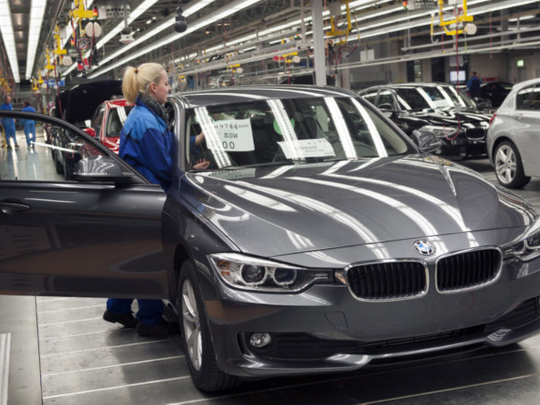
Paris: Werner Entenmann, who runs a BMW dealership in Germany’s wealthy southwest, has long made a comfortable living selling luxury sedans to well-heeled Germans at or near list price. This summer, more buyers are bargaining.
“Every day customers are coming to our showroom with offers from other brands or other BMW dealers,” said Entenmann, whose Autohaus Entenmann near Stuttgart sells about 2,200 cars a year. “This is part of our daily routine.” Profits, he said, are down as the discounts eat into margins.
Entenmann’s change in fortunes reflects the spreading effects of Europe’s sovereign debt crisis. Germany, the region’s largest car market, has been a bright spot, growing 0.7 per cent in the first half versus a 20 per cent decline in Italy and 14 per cent in France, according to the ACEA trade group, which predicts that car sales in the European Union will fall this year to the lowest level since 1995.
Still, the German market isn’t as strong as it looks. With the debt crisis suffocating car demand in other markets, automakers are pushing for sales in Europe’s biggest economy regardless whether customers are really interested in buying.
In June, 87,454 vehicles were registered to dealers and carmakers, rather than consumers, representing 29 per cent of the market, according to data from German auto-dealer group ZDK. These so-called pre-registrations totalled 479,385 in the first half, an 11 per cent jump from a year earlier.
Discount ‘Bloodbath’
To get pre-registered vehicles off dealer lots, many are quickly sold as zero-mile used cars at discounts of more than 20 per cent, according to Ferdinand Dudenhoeffer, director of the Center for Automotive Research at the University of Duisburg- Essen. These phantom sales reflect the pressure to cut prices that’s spread from southern Europe to stronger markets like Germany and the UK.
“It’s a bloodbath from a discount point of view,” said Andy Palmer, executive vice president for global planning at Nissan Motor Co.. “We work in an industry that needs volume - it needs to move metal - so manufacturers discount.”
Even Bayerische Motoren Werke AG is feeling the pressure. Though the Munich-based carmaker targets recession-resistant wealthy customers and has forecast record sales this year after introducing a revamped 3-Series sedan in February, it’s not hard to find a bargain on a new BMW.
Car site mobile.de has dozens of offers from Italy such as a latest-generation BMW 316d listed this week by a dealer in the northern town of Tavagnacco for 28,400 euros ($34,900), 16 per cent below the German sticker price. And it’s not uncommon for customers to walk into German showrooms brandishing online quotes from abroad, demanding that salesmen meet their prices.
BMW isn’t alone. A dealer in Rome listed a Mercedes-Benz C200 CDI wagon with automatic transmission, leather seats and alloy wheels on mobile.de for 33,499 euros, 22 per cent off the list price of the Daimler AG vehicle.
With more Germans seeking bargains, average new-car rebates in Germany jumped to 12 per cent of the sticker price in July, the highest rate since at least August 2010, according to trade publication Autohaus PulsSchlag. Italy’s Fiat SpA had the steepest discounts in the country, 14.7 per cent, followed by France’s PSA Peugeot Citroen and Renault SA at 14.1 per cent on average.
Slowing Growth
“Everyone is chasing the last remaining consumers in Europe, and all the cars that can’t be sold somewhere in the south are now being shipped to Germany,” said Arndt Ellinghorst, a London-based analyst with Credit Suisse.
Automakers have been hit hard by the region’s slowdown. The 13-member Euro Stoxx Autos and Parts Index has dropped 6.6 per cent over the past six months, led by a 48 per cent plunge by Peugeot, which posted a loss of 662 million euros at its auto unit in the first half. BMW’s declined 15 per cent.
Investors are stepping up bets against the industry. Short selling of stocks on the index was the highest last week since June 2010, with an average of 3.8 per cent of the shares out on loan, according to financial data provider Markit.
‘At All Cost’
“Many of our competitors are drastically pursuing volume and market share - to some degree at all cost,” said Doug Speck, sales and marketing chief at Volvo Cars. While pre- registering vehicles boosts sales in the short term, “it’s false euphoria.”
BMW’s car prices have slipped 1 per cent to 1.5 per cent on average this year, Chief Financial Officer Friedrich Eichiner said on an August 1 conference call - though those figures wouldn’t include most pre-registered vehicles sold at a deep discount. A wagon version of the new 3-Series, to be introduced in September, should help the company counter pressure to reduce prices further in Europe, Eichiner said.
That may not be enough for Entenmann. The salesman, who also heads BMW’s dealer association in Germany, is considering asking the carmaker to cut prices and ease requirements that dealers to buy specified amounts of advertising in local media.
“If the situation deteriorates further,” he said, “BMW has to help the dealers save costs.”












